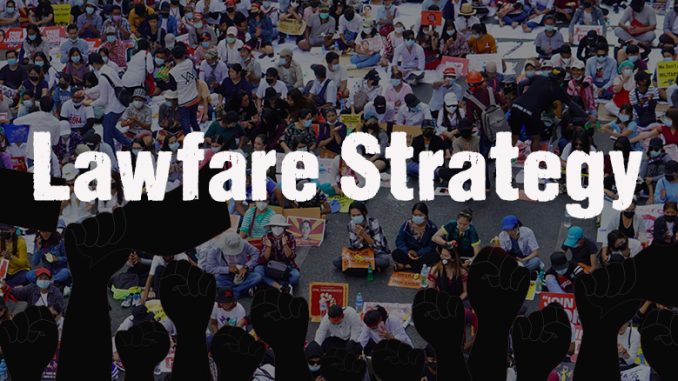
Since the coup on 1 February 2021, the Myanmar military has been facing the constant and ferocious resistance from the civilians. The members of parliament who have been ousted have formed the Committee Representing Pyidaungsu Hluttaw (CRPH), which in turn have appointed the National Unity Government of the Republic of the Union of Myanmar (NUG). The NUG– comprising Win Myint as President, Aung San Suu Kyi as State Counsellor, Duwa Lashi La, as Vice President, and Mahn Win Khaing Than as Prime Minister – claims to be the sole legitimate government of Myanmar. Along with the nationwide anti-coup protests by the citizens within the country, the NUG has been energetically interacting with foreign governments and international organisations to secure international recognition as the sole legitimate government.
What is remarkable about the NUG’s strategy so far is that it is intensely legal, as well as political. The NUG has competently employed the language of international law, publicly presented its legal arguments, and actively engaged with multiple legal processes and institutions. With the aura of legitimacy that the legal language, processes, and institutions exhibit, the NUG seeks to enhance its claims and garner support from the sympathisers around the world. This echoes what Martti Koskenniemi and James Crawford, two luminaries in the international legal field, have observed a decade ago: ‘international law has turned during the twentieth century into a ubiquitous presence in global policy-making as well as in academic and journalistic commentary.’ 1
This short essay will shed light on the many tactics of the NUG’s lawfare strategy for international recognition as the sole legitimate government of the Republic of the Union of Myanmar. It will explore some major legal moves by the NUG and discuss how they work in present-day diplomacy and international relations. Here, ‘lawfare’ will be understood in the broad sense of ‘using legal norms to try to achieve or consolidate political gains’. 2
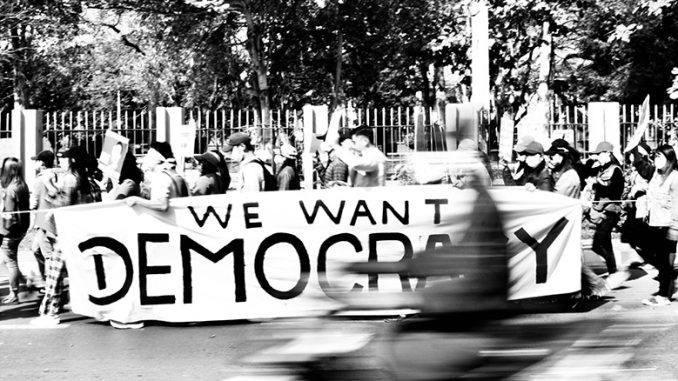
Legal Positions of the NUG
In March 2021, the CRPH has instructed a renowned, London-based law firm, Volterra Fietta, and a Spanish lawyer, Álvaro Nistal, currently with another prominent firm, Arnold & Porter, to advise on possible legal proceedings against the military regime for its violent conduct against the populations of Myanmar and their representatives. As part of the strategy, international legal arguments have been prepared to defend the NUG’s status as the sole legitimate government. On 7 September, Dr Sasa, the Spokesperson of the NUG, made public the arguments explaining why, under international law, the ‘parliamentary-designated National Unity Government (the “NUG”)’ should be regarded as, in the carefully worded phrase, 3 ‘the sole legitimate representative [of] Republic of the Union of Myanmar’. His main platforms for this include his accounts on Facebook and Twitter which have secured more than 2,000,000 followers.
According to the table summarising the NUG’s position presented by Dr Sasa, there are two main criteria for the recognition of foreign governments under international law: the effective control and democratic legitimacy. The ‘effective control test’ is further divided into three components: ‘de facto control over the territory’, ‘habitual obedience of the bulk of the population’, and ‘reasonable expectancy of permanence’. The NUG argues that it has satisfied all of these criteria, while the military has fulfilled none. It emphasises that, in stark contrast with ‘the illegal military junta regime’, it has the widespread support of many state and regional assemblies, civil servants, and civilian protestors. 4
Although presented summarily, these arguments sound plausible to international lawyers’ ears. The law governing the issue of recognition of government long regards ‘effective control’ over the large part of the territory as the principal criterion, 5 while contemporary international lawyers have been discussing whether other elements, such as democratic legitimacy, should be added to the list of criteria. 6 The NUG’s position thus wisely combines both traditional and contemporary views of the law. Additionally, its legal position was made public as recently as in September when the civilian resistance has become so widespread and persistent that it can cast some doubt on the effectiveness of the military’s control in the country. As a result, the NUG’s arguments cannot be easily rejected as outlandish or absurd. Those who seek to contest these arguments can only do so by either challenging the NUG’s understanding of the legal criteria for government recognition or refuting its interpretation of the facts and the application of the relevant law to these facts.
The strategically important point is that the NUG’s legal position invites the audiences to engage with it in terms of international legal argumentation, not political discourse or moral justification. The NUG’s move to invoke legal arguments has the effect of framing the issue in favour of its position. It illustrates how the NUG understands the power of the language of international law in contemporary diplomacy, as pointed out by Antony Anghie and Bhupinder Chimni, two leading figures in the Third World Approaches to International Law (TWAIL) movement. 7 For those seeking to contest the NUG, they will be forced to play this language game by respecting the rules of the game; that is, in order to sound credible, they will have to present their counter-arguments within the available vocabularies and grammar of international law and practice, and they will have to do so by calibrating the most persuasive arguments. For those seeking to endorse the NUG’s position, they can strengthen the NUG’s arguments by adding other legal materials and evidence, refining the arguments, or defending the same conclusion with different reasoning which may appear more convincing in their assessment. Indeed, an international NGO, Legal Action Worldwide, together with a law firm, Debevoise & Plimpton, have already expressed its support for the NUG’s status as Myanmar’s representative, largely echoing the NUG’s arguments both on the law and the facts. 8 As such, NUG’s legal arguments can serve to mobilise other governments and sympathetic civil society organisations around the world with the use of the legal language that they can easily comprehend and interact with.
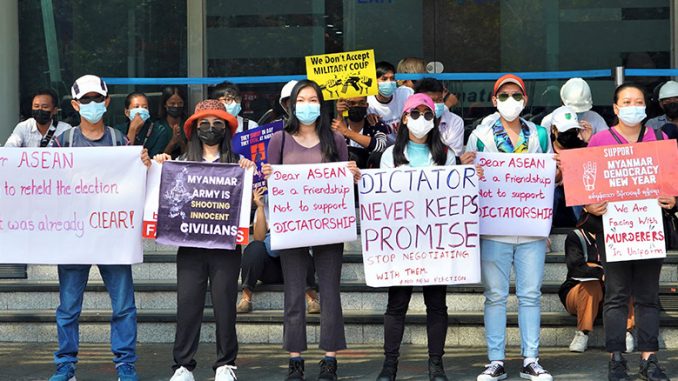
United Nations General Assembly
The timing of the publication of the NUG’s legal position as the sole legitimate representative of Myanmar seems tactical in another way. It neatly coincides with the beginning of the annual meeting of the General Assembly of the United Nations (UNGA). For the purposes of recognition, the UNGA serves as an invaluable forum, as appearing there on behalf the member state may imply the collective recognition by all UN members while significantly increasing visibility to the public at large.
Currently the head of the Myanmar delegation to the United Nations in New York remains Kyaw Moe Tun, who has been consistently calling for the strong actions against the military regime and the prompt restoration of democracy since February. The military has dismissed him and attempted to replace him, but to little avail. The diplomat appointed by the military chose to quit. In this context, the NUG’s claim as the sole legitimate representative of Myanmar helps facilitate his stay by providing legal justification for his claim to continue his position despite the dismissal of the military.
For the purposes of attending the 76th session of the annual meeting in 2021, Kyaw Moe Tun has requested the renewal of his United Nations accreditation, while the military has sent Aung Thurein with the claim and credentials to represent Myanmar. At the time of writing, the Credentials Committee, which is in charge of accreditation, has deferred the decision with regard to these competing claims until the next annual meeting. 9 As a result, Kyaw Moe Tun is allowed to continue occupying the Myanmar seat in New York. Reportedly, this is the compromise reached by the US, China, and Russia, who sit in the Credentials Committee, with the condition that Kyaw Moe Tun will not speak at the high-level meeting in the session. 10
Just like the support for the NUG’s position by Legal Action Worldwide and Debevoise & Plimpton that I have mentioned earlier, a group of activists and legal academics have submitted a detailed legal opinion to support the NUG before the beginning of the 2021 session of the UNGA meeting. The opinion thoroughly explains why the Credentials Committee should recommend the General Assembly to accept the credentials of the representative of the NUG. 11 The signatories include world-renowned international lawyers, such as Richard Goldstone, the former Chief Prosecutor of the United Nations International Criminal Tribunals for the former Yugoslavia and Rwanda, and John Dugard, emeritus professor at University of Leiden and former Judge ad hoc at the International Court of Justice.
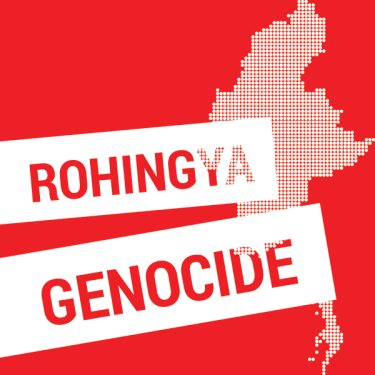
International Court of Justice
Yet another front line of the battle for the representation of Myanmar is a currently pending case before the International Court of Justice concerning the alleged genocidal acts against the Rohingya people. There, the question that the World Court is now facing is: who is to be regarded as the agent of Myanmar in this case?
The case was brought by The Gambia in 2019 under the Genocide Convention to which both Myanmar and The Gambia are party. The Gambia argues that the ‘clearance operations’ that the Tatmadaw and other Myanmar security forces have conducted against the Rohingya minority since October 2016 constitute the genocidal acts under international law. In light of the urgency and risks involved, it has also requested the ICJ to indicate provisional measures to protect the rights of the Rohingya while the case is pending.
At the provisional measure phase of the case, the (then) Myanmar government has appointed Aung San Suu Kyi as Agent. As has already been widely reported, she travelled to The Hague, apparently with an elaborate arrangement between Myanmar and the Netherlands to secure her immunity from the exercise of domestic authorities’ jurisdiction, to make an oral pleading before the judges in the Great Hall of Justice of the Peace Palace, and defend why the ICJ should decline The Gambia’s request for provisional measures. The judges were not convinced. In January 2020, the Court unanimously ordered almost all of the measures that The Gambia requested. 12
With the military’s takeover of power, the issue of representation of Myanmar is now contested. On 24 June 2021, the military regime appointed a new team for the case before the World Court. The team is to be led by Wunna Maung Lwin who has been appointed by the military regime as Foreign Minister. In response to the announcement, two lawyers who had worked for the team led by Aung San Suu Kyi – William Schabas and Phoebe Okowa – have resigned. The position of the NUG seems to have been shifting over the last several months. Prior to the announcement of the military’s team, Moe Zaw Oo, the deputy Foreign Minister of the NUG reportedly said that the NUG would not appear before the Court to defend its case but that it would accept the judgment. 13 This decision was probably made on the assumption that the military regime would similarly opt non-appearance. Recently, however, Dr Sasa has given the interview to the press, confirming the NUG’s intention to defend the case before the Court. ‘If the ICJ will allow us to represent Myanmar by appointing an agent’, he said, ‘then that is what we also will do’. 14 The counsel for The Gambia from Foley Hoag, a law firm with extensive experience before the ICJ, has already confirmed that The Gambia will continue the proceedings even if the military regime is accepted to represent Myanmar. But he added the reservation that the continuation of the proceedings in that scenario ‘does not imply The Gambia’s diplomatic recognition of Myanmar’s current de facto government’. 15
It is therefore noteworthy that the appearance before the ICJ matters to both the military and the civilian, even though the legal position that it will be forced to defend is a highly controversial one. The decision of the ICJ will become especially significant for both sides in light of the on-going non-decision of the Credentials Committee at the UNGA. The communications between the relevant parties and the Court are confidential, and as of now, the website of the ICJ has not updated any information related to the representation. How the Court will decide on the issue of Myanmar’s representation in the Rohingya case remains to be seen.
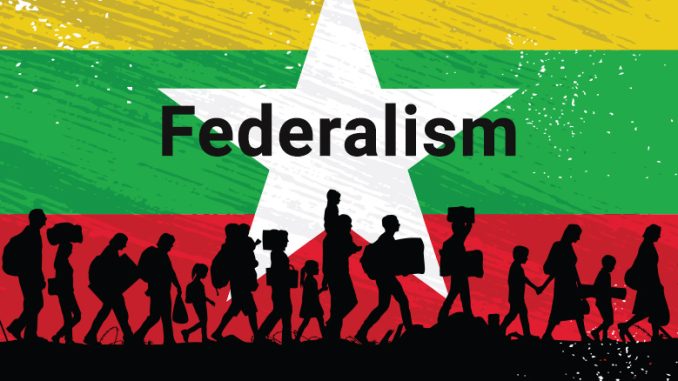
International Criminal Court
In addition to the International Court of Justice, another institution that may witness the competing claims between the civilian and the military is also in The Hague. In July, the NUG has accepted the jurisdiction of the International Criminal Court (ICC). Unlike the ICJ, which decides contentious cases between states, the ICC is a criminal court with the jurisdiction to hear criminal cases and try individuals in accordance with the Rome Statute. Until now Myanmar is not a party to the Rome Statute, and consequently the ICC does not, in principle, have jurisdiction with regard to the acts occurring entirely within the territory of Myanmar. As such, the NUG has to accept the jurisdiction if it wishes to ask the ICC to exercise jurisdiction regarding the alleged crimes committed by military officers within Myanmar. 16 In August it has announced that it has lodged a declaration with the registrar of the ICC ‘accepting the Court’s jurisdiction with respect to international crimes committed in Myanmar’s territory since 1 July 2002’. 17
One of the main aims of the NUG is, as a matter of course, to bring the military regime to justice. In the words of the NUG itself, ‘we will endeavor to seek justice and accountability for all crimes committed by the military against the Rohingya and all other people of Myanmar across the country throughout our history.’ 18 This legal move may add the momentum to the Prosecutor’s on-going investigation into the alleged forced deportation of the Rohingya population to Bangladesh. But the declaration of the jurisdiction, if accepted, will also mean that the NUG is to be regarded as the representative of Myanmar before the ICC and entitled to make legal commitments binding on the state of Myanmar under international law. The NUG’s tactical engagement with the ICC will not only put a measure of pressure and deterrence on the military officers individually, but also increase the chance of the NUG’s recognition as the legitimate representative of Myanmar. While the ICJ is still silent on this issue, the acceptance of the NUG’s declaration at the ICC will strengthen its claim as the Myanmar government and may induce the ICJ to do the same. In this way, the NUG has been making use of what international lawyers call ‘the proliferation of international courts and tribunals’–the significant increase in the number of international courts and tribunals in the wake of the Cold War.
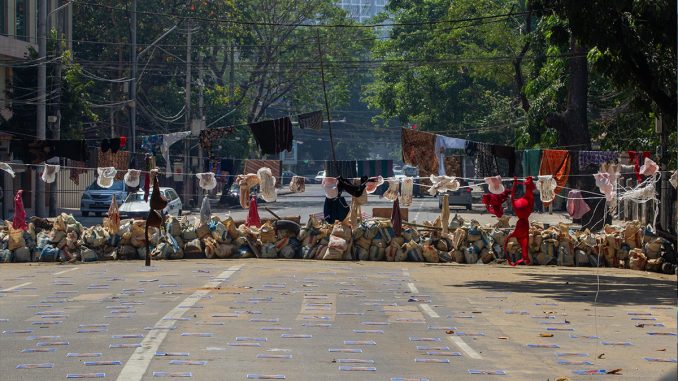
By Way of Conclusion
The on-going fight for democracy in Myanmar may seem domestic and political. And yet, it is also unmistakably international and legal. The language, processes, and institutions of international law have been strategically employed by the NUG to construct the claims, enhance its legitimacy, and gather worldwide support. It remains to be seen how it will utilise its resources to further its position and how the military will respond. But it can be said that so far the NUG is successful in managing to maintain the situation of competing claims in many fora, including in the ASEAN summit meetings, which is unprecedented and surprising to many observers. The NUG’s lawfare strategy vividly illustrates what Ian Hurd, an International Relations scholar, has observed about the role of international law in contemporary world politics. He describes law as ‘the language’ and aptly explains that:
The international rule of law comes to be “constitutional” in world politics in the sense of providing the fundamental rules within which the normal conduct of politics and contestation takes place. It is a structure of authority that is in a position of hierarchy over actors, and makes possible the “ordinary political contestation and disagreement” that make up everyday international politics. 19
Phil Saengkrai
Lecturer, Faculty of Law, Thammasat University, Thailand
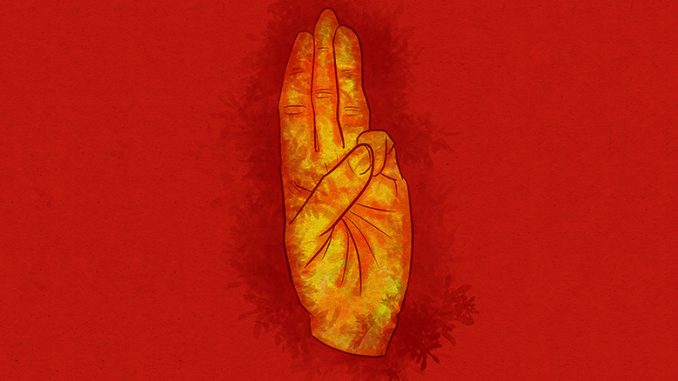
Notes:
- James Crawford and Martti Koskenniemi, ‘Introduction’ in James Crawford and Martti Koskenniemi (eds) The Cambridge Companion to International Law (Cambridge University Press 2012) 1, at 1. ↩
- Douglas Guilfoyle, ‘The Rule of Law and Maritime Security: Understanding Lawfare in the South China Sea’ (2019) 95 International Affairs 999, at 1001. ↩
- For the possible legal implications and significance of the choice of words in this context, see Stefan Talmon, ‘Recognition of Opposition Groups as the Legitimate Representative of a People’ (2013) 12 Chinese Journal of International Law 219, at 226-230. ↩
- Available at <https://www.facebook.com/DrSasa22222/photos/pcb.388455329411997/388455022745361/; https://twitter.com/DrSasa22222/status/1435111874756890624> last access 19 December 2021. ↩
- This view is expressed in many authoritative textbooks. See eg, James Crawford, Brownlie’s Principles of Public International Law (9th edn, Oxford University Press 2019) 142. ↩
- On international law and practice concerning recognition of governments, see eg Jochen Frowein, ‘Recognition’ (2010) Max Planck Encyclopedia of Public International Law available at <https://opil.ouplaw.com/view/10.1093/law:epil/9780199231690/law-9780199231690-e1086?rskey=uXVhpX&result=1&prd=MPIL>; Anne Schuit, ‘Recognition of Governments in International Law and the Recent Conflict in Libya’ (2012) 14 International Community Law Review 381; Stefan Talmon, ‘Recognition of Opposition Groups as the Legitimate Representative of a People’ (2013) 12 Chinese Journal of International Law 219. ↩
- They observe that ‘international law has now become an extraordinarily powerful language in which to frame problems, suggest fault and responsibility, propose solutions and remedies’ which ‘has serious consequences for how ordinary people live’ and that it is not ‘simply a distinctive style of argumentation’. See Antony Anghie and BS Chimni, ‘Third World Approaches to International Law and Individual Responsibility in Internal Conflict’ (2003) 2 Chinese Journal of International Law 77, at 101. ↩
- Available at <https://www.legalactionworldwide.org/accountability-rule-of-law/law-icc-victim-submission-for-rohingya-clients-following-nug-declaration/> last access 19 December 2021. ↩
- See ‘Report of the Credentials Committee’, UN Doc A/76/550 (1 December 2021). ↩
- Available at <https://www.reuters.com/world/myanmar-will-not-address-world-leaders-un-afghanistan-will-2021-09-24/> last access 19 December 2021. ↩
- Available at <https://the-world-is-watching.org/wp-content/uploads/2021/09/Myanmar-Legal-Opinion-Final-2.pdf> last access 19 December 2021. ↩
- See further, Application of the Convention on the Prevention and Punishment of the Crime of Genocide (The Gambia v Myanmar), Provisional Measures, Order of 23 January 2020, ICJ Reports 2020, p 3, available at <https://www.icj-cij.org/public/files/case-related/178/178-20200123-ORD-01-00-EN.pdf> last access 19 December 2021. ↩
- Available at <https://www.irrawaddy.com/news/burma/myanmar-junta-reorganizes-legal-team-for-icj-rohingya-genocide-case.html?fbclid=IwAR18cX7IIM31SZXEomRUWcjS_Iu2iXnjx41DPFtFlRO_z20fUSLVhwb1JgQ.> last access 19 December 2021. ↩
- Available at <https://www.frontiermyanmar.net/en/justice-in-the-balance-as-un-considers-recognition-question/> last access 19 December 2021. ↩
- Available at <https://www.frontiermyanmar.net/en/justice-in-the-balance-as-un-considers-recognition-question/> last access 19 December 2021. ↩
- This has to be distinguished from the on-going investigation into the Bangladesh/Myanmar situation where the ICC has jurisdiction because some parts of the acts occur in the territory of Bangladesh which is a party to the Rome Statute. For a brief summary, see the information on the website of the ICC, available at <https://www.icc-cpi.int/bangladesh-myanmar> last access 19 December 2021. For a legal analysis on this issue, see Payam Akhavan, ‘The Radically Routine Rohingya Case: Territorial Jurisdiction and the Crime of Deportation under the ICC Statute’ (2019) 17 Journal of International Criminal Justice 325-345. ↩
- Available at <https://www.facebook.com/mofaNUG/photos/pcb.174247464797519/174247398130859; https://twitter.com/NUGMyanmar/status/1428739347717648389> last access 19 December 2021. ↩
- Available at <https://www.facebook.com/mofaNUG/photos/pcb.174247464797519/174247398130859; https://twitter.com/NUGMyanmar/status/1428739347717648389> last access 19 December 2021. ↩
- Ian Hurd, How to Do Things with International Law (Princeton University Press 2017) 46. ↩
